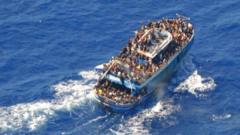New evidence has emerged challenging Greece's narrative surrounding the tragic shipwreck involving a migrant vessel that sank in June 2023, killing hundreds.
Leaked Audio Unveils Troubling Insights into Greek Rescue Efforts Amid Deadly Shipwreck

Leaked Audio Unveils Troubling Insights into Greek Rescue Efforts Amid Deadly Shipwreck
Recent recordings raise questions about Greece’s version of a migrant boat disaster that claimed hundreds of lives.
Leaked audio recordings from Greek rescue coordinators have sparked controversy, casting doubt on the official version of events surrounding the disastrous shipwreck that occurred in the early hours of June 14, 2023. The migrant boat, named Adriana, reportedly sank in international waters while trying to reach Italy, carrying an estimated 650 individuals. Survivors have raised serious allegations against the Greek Coast Guard, claiming that attempts to tow their overcrowded boat initiated its capsize and that authorities coerced witnesses into silence.
According to survivors interviewed by the BBC, they were forced into a precarious situation when the coastguards attempted a rescue that only led to further disaster. While the Greek Coast Guard maintains that the vessel was not in danger and that the migrants voluntarily sought passage to Italy, newly released recordings tell a different story. In one audio clip, a voice from a Greek rescue coordination center instructs the captain of the migrant vessel to inform an approaching ship that they do not wish to reach Greece.
The Adriana's sinking stands among the Mediterranean Sea's deadliest incidents, with estimates suggesting that as many as 750 individuals were onboard when the boat departed from Libya almost a week prior. Despite the recoveries of 82 bodies, it is feared that about 500, including women and children, remain missing.
Audio from the *Joint Rescue Coordination Centre* (JRCC) at Piraeus, Athens, reveals alarming communications. In an initial call recorded at 18:50 local time on June 13, an officer informs the captain of an approaching vessel that will provide essential supplies—stressing that the crew relay to rescuers that they do not want to go to Greece. A follow-up call reveals that the captain of this supply ship confirmed that the migrants, when polled, clearly expressed a desire to journey to Italy instead.
Though the Greek Coast Guard has not publicly commented on the content of these recordings, they have claimed to have forwarded all pertinent evidence to a Naval Court as part of the ongoing investigation. The Coast Guard argues that they have successfully rescued over 250,000 migrants in recent years and assert that their humanitarian actions have earned international recognition.
Despite these claims, human rights lawyers and organizations have expressed profound skepticism about the integrity of the investigations conducted by the Greek authorities. Recent data highlights a concerning gap in Greece's official account, indicating the overcrowded fishing vessel had reportedly been stationary for several hours before its tragic capsize. A court previously dismissed charges against nine Egyptians accused of contributing to the shipwreck, citing jurisdictional issues since the waters were classified as international. The testimony of survivors contradicts the Coast Guard’s claims, leading advocates to accuse authorities of an attempted cover-up.
Dimitris Choulis, a human rights lawyer representing some of those accused, emphasized the necessity for transparency. He remarked, "This was an attempted cover-up from day one," and criticized the authorities for demeaning the lives lost in the disaster. Ongoing investigations by human rights organizations, including Amnesty International and Human Rights Watch, alongside proceedings by the Greek Naval Court and the independent Greek Ombudsman, continue to pursue clarity and accountability in this tragic case.




















